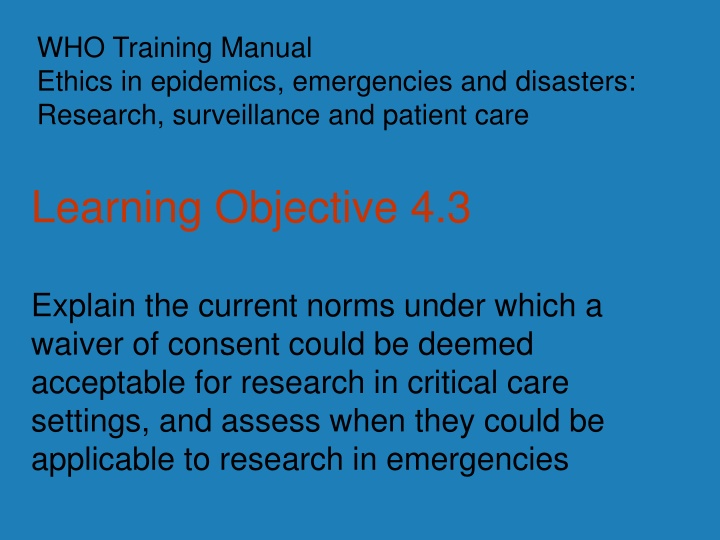
Waiver of Consent in Critical Care Research Settings
Explore the norms pertaining to waiver of consent in critical care research, particularly in emergencies. Discover when consent waivers may be deemed acceptable, the types of research where waivers may be required, and the conditions under which studies without informed consent could be permissible.
Download Presentation

Please find below an Image/Link to download the presentation.
The content on the website is provided AS IS for your information and personal use only. It may not be sold, licensed, or shared on other websites without obtaining consent from the author. If you encounter any issues during the download, it is possible that the publisher has removed the file from their server.
You are allowed to download the files provided on this website for personal or commercial use, subject to the condition that they are used lawfully. All files are the property of their respective owners.
The content on the website is provided AS IS for your information and personal use only. It may not be sold, licensed, or shared on other websites without obtaining consent from the author.
E N D
Presentation Transcript
WHO Training Manual Ethics in epidemics, emergencies and disasters: Research, surveillance and patient care Learning Objective 4.3 Explain the current norms under which a waiver of consent could be deemed acceptable for research in critical care settings, and assess when they could be applicable to research in emergencies
Outline 1. Introduction 2. Small group discussion consent in research 3. Group discussion 4. Presentation waivers of consent in public health emergency research 5. Case studies and discussion 6. Summary Suggested time Activity 0-10 (10 min) Small group discussion 11-25 (15 min) Group discussion 26-40 (15 min) Slide presentation 41-60 (20 min) Case study and discussion 61-75 (15 min) Summary and conclusion L.O. 4.3
Small group work Find arguments to justify one of the following assertions: Research should never be permitted to proceed without informed consent. Research should generally proceed without consent. L.O. 4.3
Discussion Under what conditions could a study that does not use informed consent be permissible? L.O. 4.3
Background Consent is means of achieving patient protection Difficulties arise where research is likely to produce benefits but cannot proceed if individual consent is required Critical care settings have a practice of not seeking consent under certain circumstances e.g. unconscious patient In these cases legal framework permits treatment which is in the patient s best interests L.O. 4.3
Waiver of consent Waiver of consent can be granted for research interventions under certain conditions Usually limited to minimal risk studies Can be granted to studies to develop evidence-based practice in emergency situations if research cannot be done any other way L.O. 4.3
Types of research where waiver may be required Retrospective data collection Observational epidemiological research projects Urgent intervention without time to seek consent, or where patient unable to consent L.O. 4.3
When is waiver of consent permissible? Article 3.7 The Research Ethics Board (REB) may approve research without requiring that the researcher obtain the participant s consent where the REB is satisfied, and documents, that all of the following apply: (a) the research involves no more than minimal risk to the participants; (b) the lack of the participant s consent is unlikely to adversely affect the welfare of the participant; (c) it is impossible or impracticable to carry out the research and to answer the research question properly, given the research design, if the prior consent of the participant is required; (d) whenever possible and appropriate, after participation, or at a later time during the study, participants will be debriefed and provided with additional pertinent information , at which point they will have the opportunity to refuse ; and (e) the research does not involve a therapeutic intervention, or other clinical or diagnostic interventions. Canadian Tri-Council Policy Statement (TCPS2, 2010) Departures from General Principles of Consent: L.O. 4.3
Application in public health emergencies Slightly different in public health emergencies compared to public health research The following criteria can be applied during emergencies to determine if a waiver of consent should be granted: The relative risk is assessed as being at an acceptable level; The research is judged to be of sufficient value to the affected community; The research cannot be done any other way; Consent will be sought if and when possible; and The research ethics committee is independent of the proposed research. L.O. 4.3
Case studies Case study 1: Trovan in Nigeria Case study 2: SARS in Toronto L.O. 4.3
Case studies discussion a) Do the circumstances described satisfy the conditions of minimal risk required for the waiver of consent? b) How was consent managed in the research on Trovan? How about in the case of SARS research? c) Did the processes just described mirror the ethical obligations for so-called minimal risk studies? d) Should consent be required for all public health interventions? L.O. 4.3
Summary Individual consent not always feasible in research in public health emergencies Informed consent should be standard of practice Any exception through waiver of consent should be fully justified and meet strict criteria Research ethics committee may approach such a waiver L.O. 4.3
Sources Naylor D et al. Learning from SARS: renewal of public health in Canada. (2003). A report of the National Advisory Committee on SARS and Public Health. Health Canada Publications, 1210. http://www.phac-aspc.gc.ca/publicat/sars-sras/naylor/ Shah S. Globalizing Clinical Research. (June 13, 2002). The Nation. http://www.thenation.com/article/globalizing-clinical-research?page=full Canadian Institutes of Health Research, Natural Sciences and Engineering Research Council of Canada, and Social Sciences and Humanities Research Council of Canada, Tri-Council Policy Statement: Ethical Conduct for Research Involving Humans (TCPS2), December 2010. http://www.pre.ethics.gc.ca/eng/policy-politique/initiatives/tcps2- eptc2/Default/National Institute of Dental and Craniofacial Research (NIDCR) Minimal Risk Protocol Template (last updated July 2013) http://www.nidcr.nih.gov/Research/ToolsforResearchers/Toolkit/MinimalRiskProtocolTe mplate.htm L.O. 4.3
Acknowledgements Chapter author Schwartz, Lisa, Department of Clinical Epidemiology and Biostatistics, McMaster University, Hamilton, Ontario, Canada L.O. 4.3
